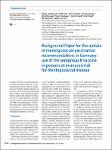Background Paper for the update of meningococcal vaccination recommendations in Germany: use of the serogroup B vaccine in persons at increased risk for meningococcal disease
Hellenbrand, Wiebke
Koch, Judith
Harder, Thomas
Bogdan, Christian
Heininger, Ulrich
Tenenbaum, Tobias
Terhardt, Martin
Vogel, Ulrich
Wichmann, Ole
Kries, Rüdiger von
In December 2013 Bexsero® became available in Germany for vaccination against serogroup B meningococci (MenB). In August 2015 the German Standing Committee on Vaccination (STIKO) endorsed a recommendation for use of this vaccine in persons at increased risk of invasive meningococcal disease (IMD). This background paper summarizes the evidence underlying the recommendation. Bexsero® is based on surface protein antigens expressed by about 80 % of circulating serogroup B meningococci in Germany. The paper reviews available data on immunogenicity and safety of Bexsero® in healthy children and adolescents; data in persons with underlying illness and on the effectiveness in preventing clinical outcomes are thus far unavailable. STIKO recommends MenB vaccination for the following persons based on an individual risk assessment: (1) Persons with congenital or acquired immune deficiency or suppression. Among these, persons with terminal complement defects and properdin deficiency, including those under eculizumab therapy, are at highest risk with reported invasive meningococcal disease (IMD) incidences up 10,000-fold higher than in the general population. Persons with asplenia were estimated to have a ~ 20–30-fold increased risk of IMD, while the risk in individuals with other immune defects such as HIV infection or hypogammaglobulinaemia was estimated at no more than 5–10-fold higher than the background risk. (2) Laboratory staff with a risk of exposure to N. meningitidis aerosols, for whom an up to 271-fold increased risk for IMD has been reported. (3) Unvaccinated household (-like) contacts of a MenB IMD index case, who have a roughly 100–200-fold increased IMD risk in the year after the contact despite chemoprophylaxis. Because the risk is highest in the first 3 months and full protective immunity requires more than one dose (particularly in infants and toddlers), MenB vaccine should be administered as soon as possible following identification of the serogroup of the index case.
Dateien zu dieser Publikation
Keine Lizenzangabe

